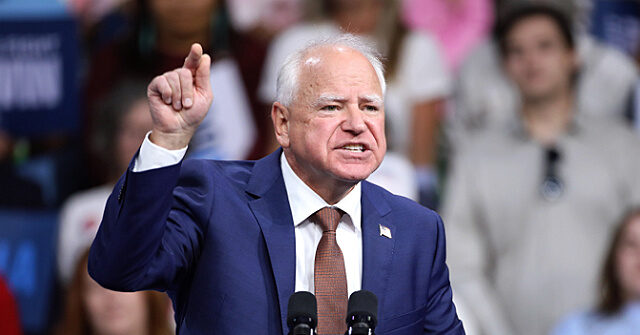In a recent interview with Minnesota Public Radio, Tim Walz, the former vice presidential candidate, expressed his astonishment over the outcome of the election in which Americans opted for President-elect Donald Trump once again. Walz, who served as Minnesota’s governor and was the running mate of Vice President Kamala Harris, reflected on his own financial background, noting that he might have been the least wealthy person to ever run for vice president. He viewed this fact as a “real flex,” highlighting a contrast between his working-class roots and the affluent backgrounds of his opponents. Walz’s rhetorical question—“How in the world did we lose to a billionaire?”—revealed his confusion and disappointment over the election results.
Throughout the interview, Walz emphasized the importance of connecting with middle-class voters, asserting that he believed his experience as a country attorney and high school teacher would resonate with them. He claimed that many Americans would appreciate his understanding of their struggles, as he is familiar with paying bills and navigating financial challenges. This perspective underscores his belief that a candidate’s relatability is crucial in garnering support from critical voter demographics. However, he expressed concern that the Harris campaign failed to effectively communicate this connection, admitting that the disconnect with the middle class “keeps me up at night.”
Walz lamented that, despite presenting several appealing ideas, the Democratic Party failed to resonate with a majority of the electorate this past election cycle. He highlighted the irony in Trump’s victory, given the latter’s controversial history, including his reluctance to pay workers overtime and his intentions to dismantle the Affordable Care Act (ACA). Walz’s criticisms signal a broader concern among Democrats regarding their messaging and ability to attract votes from individuals who may have felt overlooked or unrepresented by the party’s platform.
Further, Walz recognized that the Democratic ticket, including Harris and himself, did not adequately address the anxieties and aspirations of middle-class Americans. His conclusions reflect a thoughtful analysis of the party’s shortcomings and the need for a reassessment of strategies aimed at engagement with these voters. Walz’s insights suggest that Democrats must enhance their focus on demonstrating genuine empathy and understanding toward the challenges faced by the working class if they hope to rebuild trust and support in future elections.
Additionally, Walz’s reflections highlight the significant challenge that the Democratic Party faces in appealing to a diverse electorate. The 2020 election exposed rifts in how different voter groups perceive candidates and their policies. The fact that many chose to support a candidate with a billionaire status suggested that other factors, such as personal branding, perceived strength, and populist rhetoric, played vital roles in voter decisions. Walz acknowledged that the Democratic Party’s established narratives about wealth and privilege might not have resonated as intended, signaling that a more nuanced approach may be necessary moving forward.
In conclusion, Tim Walz’s conversation underscores a critical self-examination within the Democratic Party following the recent election. It reflects a need for introspection and adjustment in how they connect with middle-class voters. Walz’s personal anecdote serves as a microcosm of the broader disconnect that exists, illustrating that, despite admirable intentions and policy proposals, Democrats must work diligently to bridge gaps in understanding and communication to foster a more robust connection with the electorate. As the party moves forward, these reflections could serve as a guiding framework for strategizing future campaigns, aiming to ensure that all segments of society feel represented and valued in the political landscape.

